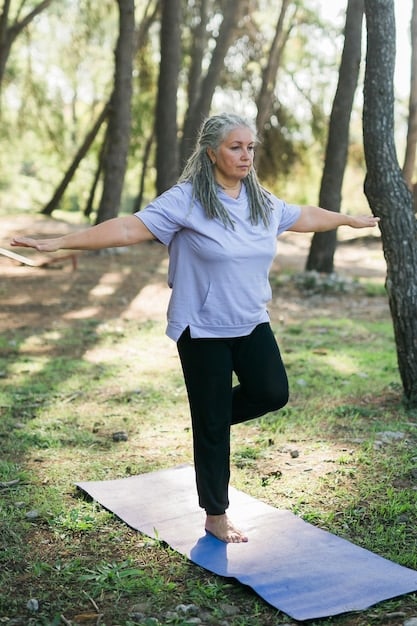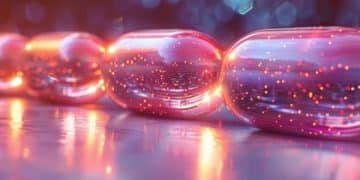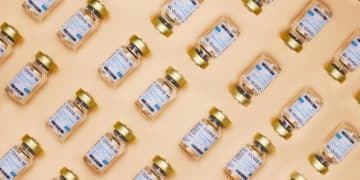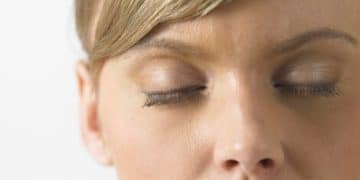Anti-Aging Supplements for Menopause: What Works in 2025?

For women navigating menopause in 2025, effective anti-aging supplements often focus on hormonal balance, bone density, and cognitive health, with scientifically-backed ingredients like phytoestrogens, collagen peptides, and adaptogens showing promise in mitigating age-related symptoms.
As women approach and experience menopause, the search for effective ways to maintain vitality and combat age-related shifts intensifies. The market for anti-aging supplements is booming, promising solutions to everything from hot flashes to bone loss. But with so many options, what actually works when it comes to Anti-Aging Supplements for Menopause: What Actually Works in 2025?
Understanding Menopausal Changes and Anti-Aging Needs
Menopause is a natural biological transition, typically occurring between the ages of 45 and 55, marking the end of a woman’s reproductive years. It’s characterized by a significant decline in estrogen and progesterone production, hormones that play crucial roles far beyond reproduction. This hormonal shift orchestrates a cascade of changes throughout the body, influencing everything from bone density to skin elasticity and even cognitive function.
The anti-aging aspect during menopause isn’t about halting the natural process, but rather mitigating its less desirable effects and optimizing health for the decades ahead. Women often seek to address common concerns such as a decline in skin collagen, leading to wrinkles and loss of firmness, reduced bone mineral density increasing osteoporosis risk, and cardiovascular health changes. Additionally, shifts in mood, energy levels, and cognitive sharpness are frequently reported, driving interest in holistic solutions that support overall well-being.
In 2025, the conversation around anti-aging in menopause is shifting from merely treating symptoms to proactive, comprehensive health management. This involves understanding the intricate ways hormonal fluctuations impact various bodily systems and identifying targeted interventions. Diet, exercise, stress management, and adequate sleep form the foundation, but many women also look to specialized supplements to fill nutritional gaps and provide additional support during this transformative period.
The Hormonal Rollercoaster and Its Impact
The fluctuating and eventually declining levels of estrogen are central to many menopausal symptoms that are often perceived as “aging.” Estrogen receptors are found throughout the body, including in the brain, bones, skin, and cardiovascular system. When estrogen levels drop, these systems are directly affected, leading to symptoms such as:
- Hot flashes and night sweats
- Vaginal dryness and discomfort
- Mood swings and irritability
- Sleep disturbances
Understanding this hormonal interplay is key to evaluating which anti-aging supplements might be most beneficial. Many proposed solutions aim to either mimic estrogen’s effects, support the body’s own hormonal balance, or provide direct support to tissues and organs impacted by hormone deficiency.
The goal isn’t to rewind the clock to a pre-menopausal state but to support the body’s resilience and vitality, ensuring a high quality of life through and beyond this significant life stage. Exploring supplements means looking for ingredients that have a demonstrable positive impact on these specific areas of concern, backed by scientific research, rather than just anecdotal claims.
Phytoestrogens: Natural Support for Hormonal Balance
Phytoestrogens are compounds found naturally in plants that have a chemical structure similar to estrogen, allowing them to bind to estrogen receptors in the body. While their effect is much weaker than endogenous estrogen, they can exert mild estrogenic or anti-estrogenic effects, potentially helping to balance hormone fluctuations during menopause. This makes them a frequent target for women seeking natural anti-aging solutions for menopausal symptoms.
One of the most well-researched categories of phytoestrogens includes isoflavones, commonly found in soy products, red clover, and various legumes. Lignans, present in flaxseeds and whole grains, are another significant group. Coumestans, found in alfalfa and clover, are also phytoestrogens. The interest in these compounds stems from observations of lower rates of menopausal symptoms in cultures with high dietary intake of phytoestrogen-rich foods.
While research findings can vary, some studies suggest that phytoestrogens may help reduce the frequency and severity of hot flashes and night sweats, two of the most common and disruptive menopausal symptoms. Beyond symptom relief, their potential benefits extend to bone health, where they might help minimize bone loss, and cardiovascular health, though more research is needed to confirm these broader anti-aging effects consistently.
Soy Isoflavones and Red Clover
Soy isoflavones, particularly genistein and daidzein, are among the most studied phytoestrogens for menopausal relief. They are believed to interact with estrogen receptors, offering a gentle alternative to hormone replacement therapy for some women. Clinical trials have yielded mixed results, with some showing significant reduction in hot flashes and vaginal dryness, while others report minimal or no effect. This variability often depends on the individual’s gut microbiome, which can influence how effectively these compounds are metabolized and absorbed.
- Genistein: May help improve bone density and reduce hot flashes.
- Daidzein: Converts into equol in some individuals, an even more potent phytoestrogen.
- Red Clover: Contains several isoflavones, including formononetin and biochanin A, often marketed for hot flash relief.
Another popular option is red clover, which boasts a rich profile of isoflavones. Products containing red clover extract are frequently marketed as natural remedies for menopausal discomfort. The efficacy, similar to soy, can be individual-dependent. When considering these supplements, it’s crucial to consult with a healthcare provider, especially if there’s a history of hormone-sensitive conditions, as the long-term effects and interactions with other medications should be carefully evaluated.
While phytoestrogens offer a compelling natural approach to anti-aging during menopause, current scientific consensus suggests they are more effective for symptom management than profound ‘anti-aging’ reversal. Their role appears to be supportive rather than transformative, helping to smooth the transition for many women.

Collagen and Bone Health Support
As women enter perimenopause and menopause, declining estrogen levels significantly impact collagen production, leading to visible signs of aging like decreased skin elasticity, fine lines, and wrinkles. Collagen is the most abundant protein in the body, providing structure to skin, bones, muscles, tendons, and ligaments. Simultaneously, bone density naturally decreases, increasing the risk of osteoporosis, a major health concern for postmenopausal women. Therefore, supplements targeting both collagen and bone health are gaining considerable attention in the anti-aging discussion for this demographic.
The rationale behind collagen supplementation for anti-aging in menopause is straightforward: replenish the diminished collagen stores. Collagen peptides, often derived from bovine or marine sources, are hydrolyzed forms of collagen, meaning they are broken down into smaller, more easily digestible units. Once ingested, these peptides are absorbed and distributed throughout the body, where they can stimulate the body’s own collagen production. Research suggests that regular intake can improve skin hydration, elasticity, and reduce the appearance of wrinkles, offering a tangible anti-aging benefit.
For bone health, the focus shifts to ensuring adequate availability of essential minerals and vitamins that support bone formation and maintenance. Calcium and Vitamin D are foundational, but other micronutrients like Magnesium and Vitamin K2 also play critical roles. Supplement blends often combine these elements to provide comprehensive support for strong bones, thereby mitigating one of the most serious age-related risks exacerbated by menopause.
Key Supplements for Skin Elasticity and Bone Density
When considering supplements for skin and bone health, it’s important to look for well-absorbed forms and combinations of ingredients. The synergy between different nutrients can often enhance their individual effects.
- Collagen Peptides: Oral collagen supplements have been shown to improve skin elasticity, hydration, and dermal collagen density. For best results, look for hydrolyzed collagen with a high bioavailability.
- Vitamin D: Essential for calcium absorption and bone mineralization. Many menopausal women are deficient, making supplementation crucial for preventing osteoporosis.
- Calcium: The primary mineral component of bones. While dietary sources are preferred, supplements may be necessary to meet daily recommended intakes, especially for those with low dairy consumption.
- Magnesium: Plays a vital role in bone formation and influences parathyroid hormone and vitamin D metabolism, both critical for bone health.
- Vitamin K2: Directs calcium to the bones and away from arteries, thus supporting both bone and cardiovascular health. It’s an often-overlooked nutrient in bone health strategies.
Moreover, some supplements combine these elements to offer a more convenient and potentially more effective approach. For instance, formulations that include collagen alongside Vitamin C (essential for collagen synthesis), hyaluronic acid (for skin hydration), and a spectrum of bone-supporting minerals can provide multi-faceted benefits. It’s always advisable to discuss appropriate dosages and potential interactions with a healthcare provider, particularly because excessive calcium supplementation can have adverse effects if not properly balanced with other nutrients.
Ultimately, supporting collagen and bone health through targeted supplementation during menopause is a proactive strategy to maintain both aesthetic vitality and structural integrity, contributing significantly to a woman’s overall well-being and anti-aging efforts.
Cognitive Enhancers and Mood Stabilizers
Menopause often brings about noticeable changes in cognitive function, such as “brain fog,” difficulty concentrating, and memory lapses. These symptoms, coupled with mood fluctuations like increased irritability, anxiety, and even depression, are largely attributed to the fluctuating and declining levels of estrogen, which plays a protective and regulatory role in brain health. Addressing these challenges is a significant part of the anti-aging strategy for menopausal women, as maintaining mental acuity and emotional stability is crucial for quality of life. Supplements that act as cognitive enhancers and mood stabilizers are increasingly popular.
The impact of estrogen on neurotransmitters and brain blood flow means that its decline can affect various brain functions. Supplements designed to support cognitive health often aim to improve blood flow to the brain, protect neural cells from oxidative stress, and enhance neurotransmitter activity. For mood stabilization, ingredients that influence serotonin and GABA pathways are frequently explored. The goal is not just to alleviate immediate symptoms but to support long-term brain health and resilience against age-related cognitive decline.
Many women seek natural alternatives to pharmaceutical interventions for these symptoms, leading to a growing interest in nutraceuticals with adaptogenic and neuroprotective properties. These supplements aim to provide a more holistic approach, working with the body’s natural processes rather than overriding them, making them a cornerstone of anti-aging regimens in 2025.
Promising Ingredients for Brain and Mood Support
Several ingredients have emerged as promising candidates for supporting cognitive function and mood during menopause. Their efficacy varies, and individual responses can differ, but they offer potential avenues for improvement.
- Omega-3 Fatty Acids (EPA & DHA): Essential for brain health, supporting synaptic function, reducing inflammation, and potentially improving mood. They are crucial components of brain cell membranes.
- Rhodiola Rosea: An adaptogen known for its ability to help the body adapt to stress, potentially reducing fatigue and improving mental performance and mood.
- Ginseng (Panax Ginseng): Believed to enhance cognitive function, reduce fatigue, and modulate stress responses, contributing to improved mental clarity and energy.
- Magnesium L-Threonate: A form of magnesium specifically designed to cross the blood-brain barrier, potentially improving memory and cognitive abilities.
- Ashwagandha: Another adaptogen, recognized for its anti-anxiety and stress-reducing properties, which can indirectly support mood and sleep quality, benefiting cognitive function.
Beyond these, various B vitamins, particularly B6, B9 (folate), and B12, are vital for neurological function and neurotransmitter synthesis. Deficiencies in these vitamins can exacerbate mood disturbances and cognitive challenges. Curcumin, the active compound in turmeric, is also being studied for its anti-inflammatory and neuroprotective effects, which could have anti-aging implications for brain health.
When selecting supplements for cognitive and mood support, it is prudent to prioritize those with evidence-based research and to choose reputable brands. Consulting with a healthcare professional can help tailor the approach to individual needs, considering potential interactions with other medications and pre-existing health conditions.
Antioxidants and Inflammation Control
Inflammation and oxidative stress are widely recognized as primary drivers of cellular aging and chronic diseases. During menopause, the decline in estrogen can lead to an increase in systemic inflammation and a decrease in the body’s natural antioxidant defenses. This imbalance can accelerate the aging process, contributing to issues like cardiovascular disease, cognitive decline, and skin aging. Consequently, a core component of any effective anti-aging strategy for menopausal women in 2025 must include supplements focused on providing robust antioxidant protection and controlling inflammatory pathways.
Antioxidants work by neutralizing free radicals, unstable molecules that can damage cells and DNA. By mitigating this damage, antioxidants help preserve cellular function and integrity, which is fundamental to maintaining youthful vitality. Anti-inflammatory compounds, on the other hand, target the underlying inflammatory responses, preventing them from becoming chronic and damaging. The synergy between these two actions offers powerful protection against the myriad ways in which aging manifests.
The market is replete with supplements promising antioxidant and anti-inflammatory benefits. However, discerning what actually works involves looking for specific compounds with strong scientific backing and an understanding of their bioavailability. The aim is to support the body’s natural defense mechanisms and reduce the cumulative cellular stress that can accelerate age-related conditions.
Top Choices for Antioxidant and Anti-Inflammatory Support
A selection of supplements stands out for their potential to combat oxidative stress and inflammation, offering compelling anti-aging benefits for women in menopause:
- Coenzyme Q10 (CoQ10): A potent antioxidant crucial for cellular energy production. Levels naturally decline with age and are impacted by certain medications. Supplementation can support heart health and energy levels.
- Alpha-Lipoic Acid (ALA): A unique antioxidant that is both water- and fat-soluble, allowing it to work throughout the body’s cells. It also helps regenerate other antioxidants like Vitamin C and E.
- Resveratrol: Found in grapes and berries, this polyphenol is celebrated for its strong antioxidant properties and its role in activating sirtuins, proteins linked to longevity and cellular repair.
- Curcumin (from Turmeric): A powerful anti-inflammatory compound. Its bioavailability can be enhanced when paired with piperine (black pepper extract). It supports joint health, cognitive function, and systemic inflammation reduction.
In addition to these specific compounds, Vitamin C and Vitamin E are classic antioxidants that should not be overlooked. Vitamin C is essential for collagen synthesis and immune function, while Vitamin E protects cell membranes from oxidative damage. A holistic approach often includes a diversified intake of various antioxidants, ideally from both diet and targeted supplementation.
By proactively managing oxidative stress and inflammation, menopausal women can significantly contribute to their anti-aging efforts, supporting not just the visible signs of aging but also the underlying cellular health that dictates long-term well-being.
Gut Health and Anti-Aging Connections in Menopause
The intricate relationship between gut health and overall well-being is undeniable, and its importance intensifies during menopause when hormonal shifts can profoundly impact the gut microbiome. A balanced and diverse gut flora plays a crucial role in nutrient absorption, immune function, and even hormone metabolism, specifically the processing of estrogen. As estrogen levels decline, the gut microbiome can undergo changes that may contribute to menopausal symptoms and accelerate aspects of aging. Therefore, supporting gut health becomes an essential, albeit often overlooked, component of anti-aging strategies for women in 2025.
An unhealthy gut, often characterized by dysbiosis (an imbalance of beneficial and harmful bacteria), can lead to chronic inflammation, reduced nutrient absorption, and a compromised gut lining, known as “leaky gut.” These issues can exacerbate menopausal symptoms such as mood swings, hot flashes, and weight gain, and also contribute to systemic inflammation and oxidative stress, both of which accelerate cellular aging. By improving gut health, women can enhance their body’s ability to utilize nutrients, regulate hormones, and strengthen immune defenses, thereby supporting their anti-aging goals from the inside out.
Supplementation aimed at restoring and maintaining gut health for menopausal and postmenopausal women focuses on promoting beneficial bacterial growth and supporting gut barrier integrity. This proactive approach can lead to a noticeable improvement in digestive comfort, mood, energy levels, and even skin appearance, making it a critical foundation for any comprehensive anti-aging plan.
Probiotics, Prebiotics, and Beyond
Targeted supplements for gut health can make a significant difference. Understanding the distinction between probiotics and prebiotics, and recognizing other supportive nutrients, is key to an effective strategy.
- Probiotics: Live microorganisms that, when administered in adequate amounts, confer a health benefit on the host. Specific strains like Lactobacillus and Bifidobacterium have been studied for their roles in women’s health, including hormone metabolism and immune support.
- Prebiotics: Non-digestible food ingredients that selectively stimulate the growth and/or activity of beneficial bacteria in the colon. Common prebiotics include inulin, FOS (fructooligosaccharides), and GOS (galactooligosaccharides). They essentially feed the good bacteria.
Beyond traditional probiotics and prebiotics, other supplements deserve attention for their gut-supporting roles:
L-Glutamine: An amino acid that is vital for the integrity of the intestinal lining. It can help repair and maintain the gut barrier, reducing intestinal permeability and inflammation, which is particularly beneficial for those with a “leaky gut.”
Digestive Enzymes: As we age, the production of digestive enzymes can naturally decrease, leading to inefficient digestion and nutrient absorption. Supplementation can support the breakdown of food, ensuring that vital anti-aging nutrients are fully absorbed and utilized by the body.
The diversity of the gut microbiome is paramount, and a diet rich in fiber, fermented foods, and a variety of plant-based foods is the cornerstone. However, for many women in menopause, targeted supplementation can provide the necessary boost to rebalance the gut, optimize functioning, and consequentially support overall anti-aging efforts. Integrating gut health into an anti-aging regimen is about creating a stronger, more resilient foundation for health.

The Role of Lifestyle: Beyond Supplements
While the focus on anti-aging supplements for menopause is central to this discussion, it’s critical to acknowledge that these supplements are not magic pills. Their efficacy is significantly amplified when integrated into a holistic, healthy lifestyle. In 2025, the understanding of anti-aging has matured to recognize that foundational habits—diet, exercise, sleep, and stress management—are paramount. These lifestyle choices synergize with supplements, creating a powerful defense against age-related decline and enhancing overall well-being during and after menopause.
Nutrition, in particular, forms the bedrock of anti-aging. A diet rich in whole foods, lean proteins, healthy fats, and an abundance of fruits and vegetables provides the essential vitamins, minerals, and antioxidants needed for cellular health. Avoiding processed foods, excessive sugar, and unhealthy fats can reduce inflammation and oxidative stress, which are key drivers of aging. For menopausal women, specific dietary considerations, such as adequate calcium and vitamin D intake, become even more important for bone health. A nutrient-dense diet also supports a healthy gut microbiome, which, as discussed, plays a crucial role in hormone balance and overall health.
Furthermore, regular physical activity is indispensable. Exercise, ranging from cardiovascular workouts to strength training and flexibility practices, offers a multitude of anti-aging benefits. It helps maintain bone density, preserves muscle mass (which naturally declines with age), improves cardiovascular health, boosts mood, and enhances cognitive function. For menopausal women, exercise can also alleviate symptoms like hot flashes and improve sleep quality, making it a non-negotiable component of an anti-aging strategy.
Integrating Healthy Habits for Optimal Results
The true power of anti-aging during menopause lies in the combination of smart supplementation and consistent healthy habits. Neglecting one in favor of the other often leads to suboptimal outcomes. Here’s how these elements seamlessly integrate:
- Consistent Exercise: Aim for a mix of aerobic activities, strength training, and flexibility exercises. This boosts circulation, mood, bone density, and metabolism.
- Mindful Nutrition: Focus on a diverse, plant-rich diet to provide essential micronutrients and fiber, supporting gut health and reducing inflammation. Complement with protein for muscle maintenance and healthy fats for hormone production.
- Quality Sleep: Prioritize 7-9 hours of restorative sleep per night. Sleep is when the body repairs and regenerates, crucial for hormone balance and cognitive function. Melatonin supplements can sometimes aid short-term, but establishing a consistent sleep routine is key.
- Stress Management: Chronic stress elevates cortisol, accelerating aging. Practices like meditation, yoga, deep breathing, and spending time in nature can significantly mitigate stress, positively impacting overall health and reducing symptoms of menopause.
Hydration is another simple yet powerful anti-aging tool. Drinking enough water supports skin elasticity, aids digestion, and helps transport nutrients throughout the body. While supplements can help address specific deficiencies or fortify certain systems, they work best when the body is already nourished and cared for through these fundamental lifestyle practices.
Ultimately, anti-aging during menopause is a comprehensive journey. Supplements are valuable allies, but they are most effective when supported by a balanced diet, regular exercise, adequate sleep, and effective stress management. Embracing this holistic approach empowers women to navigate menopause with vitality and grace, truly optimizing their health for the years ahead.
Navigating the Market: What to Look For and Avoid
The supplement industry is vast and largely unregulated, making it challenging for consumers to distinguish between effective products and those making unsupported claims. For women seeking anti-aging supplements during menopause in 2025, discerning what actually works involves careful scrutiny and an informed approach to purchasing. Not all supplements are created equal, and some may even contain harmful ingredients or lack the advertised dosages, underscoring the importance of vigilance.
A critical first step is to prioritize supplements backed by scientific research, ideally clinical studies conducted on humans. This means looking beyond anecdotal testimonials and seeking evidence from peer-reviewed journals. However, interpreting scientific literature can be complex, so relying on trusted health professionals or reputable health organizations for guidance is invaluable. Furthermore, understanding the difference between a supplement that claims to support a function versus one that has demonstrated significant, measurable anti-aging effects is crucial.
Another important consideration is the quality and sourcing of ingredients. The purity, potency, and bioavailability of a supplement deeply impact its effectiveness. Poor manufacturing practices can lead to contamination, inconsistent dosages, or ingredients that are poorly absorbed by the body, rendering the supplement ineffective or even harmful. Therefore, a proactive approach to research and selection is not just about finding what works, but also about ensuring safety and value for money.
Guidelines for Smart Supplement Choices
To navigate the complex supplement market successfully, consider the following practical guidelines that will empower menopausal women to make informed decisions:
- Third-Party Certification: Look for supplements that have been tested and certified by independent third-party organizations (e.g., NSF International, USP, ConsumerLab.com). These certifications ensure that the product contains what it claims on the label and is free from harmful contaminants.
- Reputable Brands: Stick to established brands with a track record of quality and transparency. Research the company’s background, manufacturing processes, and commitment to scientific validation.
- Bioavailability: Pay attention to the form of the nutrient. For example, magnesium citrate or glycinate are typically more bioavailable than magnesium oxide. Similarly, liquid or liposomal forms of some vitamins might offer better absorption.
- Avoid Proprietary Blends: These often hide the exact dosages of individual ingredients, making it impossible to determine if you’re getting effective amounts. Transparent labeling is key.
- Read Reviews Critically: While reviews can offer insights, prioritize those that are detailed and mention specific effects, rather than vague endorsements. Be wary of overly enthusiastic or generic reviews.
- Consult with a Healthcare Professional: Before starting any new supplement regimen, especially for anti-aging purposes during menopause, consult with a doctor or a registered dietitian. They can provide personalized advice, assess potential interactions with medications, and help identify any underlying deficiencies.
Moreover, be cautious of products that promise “miracle cures” or make extravagant claims that seem too good to be true. True anti-aging success is typically a gradual process, supported by consistent effort and a combination of strategies. By adopting a critical and informed approach, menopausal women can confidently select anti-aging supplements that genuinely contribute to their health and well-being in 2025.
| Key Area | Effective Solutions |
|---|---|
| 🌱 Hormonal Balance | Phytoestrogens (soy isoflavones, red clover) can mitigate hot flashes. |
| 🦴 Bone & Skin Health | Collagen peptides, Vitamin D, Calcium, Magnesium, Vitamin K2 are vital. |
| 🧠 Cognitive & Mood | Omega-3s, adaptogens (Rhodiola, Ashwagandha) support brain function and mood. |
| 🛡️ Cellular Protection | Antioxidants (CoQ10, Resveratrol, Curcumin) fight oxidative stress and inflammation. |
Frequently Asked Questions About Menopause Anti-Aging Supplements
No, anti-aging supplements are not a direct substitute for HRT. While some supplements, like phytoestrogens, may offer mild hormone-mimicking effects, they do not replace the physiological impact of prescribed HRT. Consult your doctor to discuss the best approach for your menopausal symptoms and overall health needs.
The timeline for results can vary significantly depending on the supplement, individual metabolism, and consistency of use. Some women may notice improvements in a few weeks, while others might require several months to experience full benefits, especially for issues like bone density or skin elasticity. Patience and consistent use are key.
Taking multiple supplements is common, but it’s crucial to do so cautiously. Some supplements can interact with each other or with medications, potentially causing adverse effects or reducing efficacy. Always inform your healthcare provider about all supplements you are taking to ensure safety and prevent unwanted interactions.
Women with a history of hormone-sensitive cancers should exercise extreme caution with supplements like phytoestrogens, as their estrogen-like activity might be a concern. Additionally, avoid products with undisclosed “proprietary blends” or those making exaggerated claims without scientific backing. Always consult a healthcare professional before starting any new supplement.
Supplements are most effective when combined with a healthy lifestyle. Prioritize a balanced, nutrient-rich diet, regular physical activity (including strength training), adequate sleep (7-9 hours), and effective stress management techniques. These foundational habits significantly contribute to overall well-being and combat age-related decline during menopause.
Conclusion
Navigating menopause brings unique challenges, but also opportunities to redefine health and vitality. As we move through 2025, the landscape of anti-aging supplements for menopausal women is both promising and complex. While no single supplement offers a magic bullet, a strategic and informed approach, combining scientifically-backed ingredients with a robust, holistic lifestyle, can significantly mitigate age-related changes and enhance quality of life. Understanding the specific needs—from hormonal balance and bone density to cognitive function and inflammation control—empowers women to make choices that truly work for them, transforming menopause into a period of empowered wellness rather than decline.





